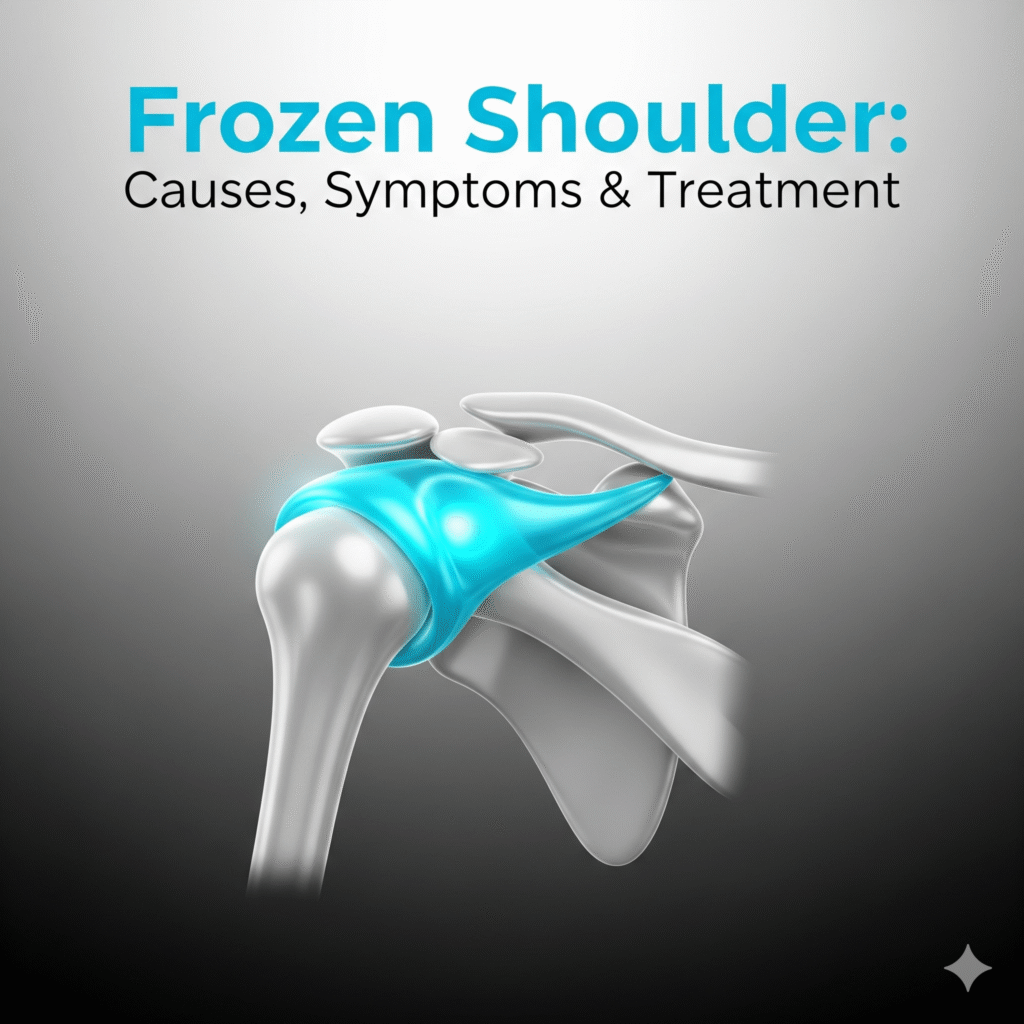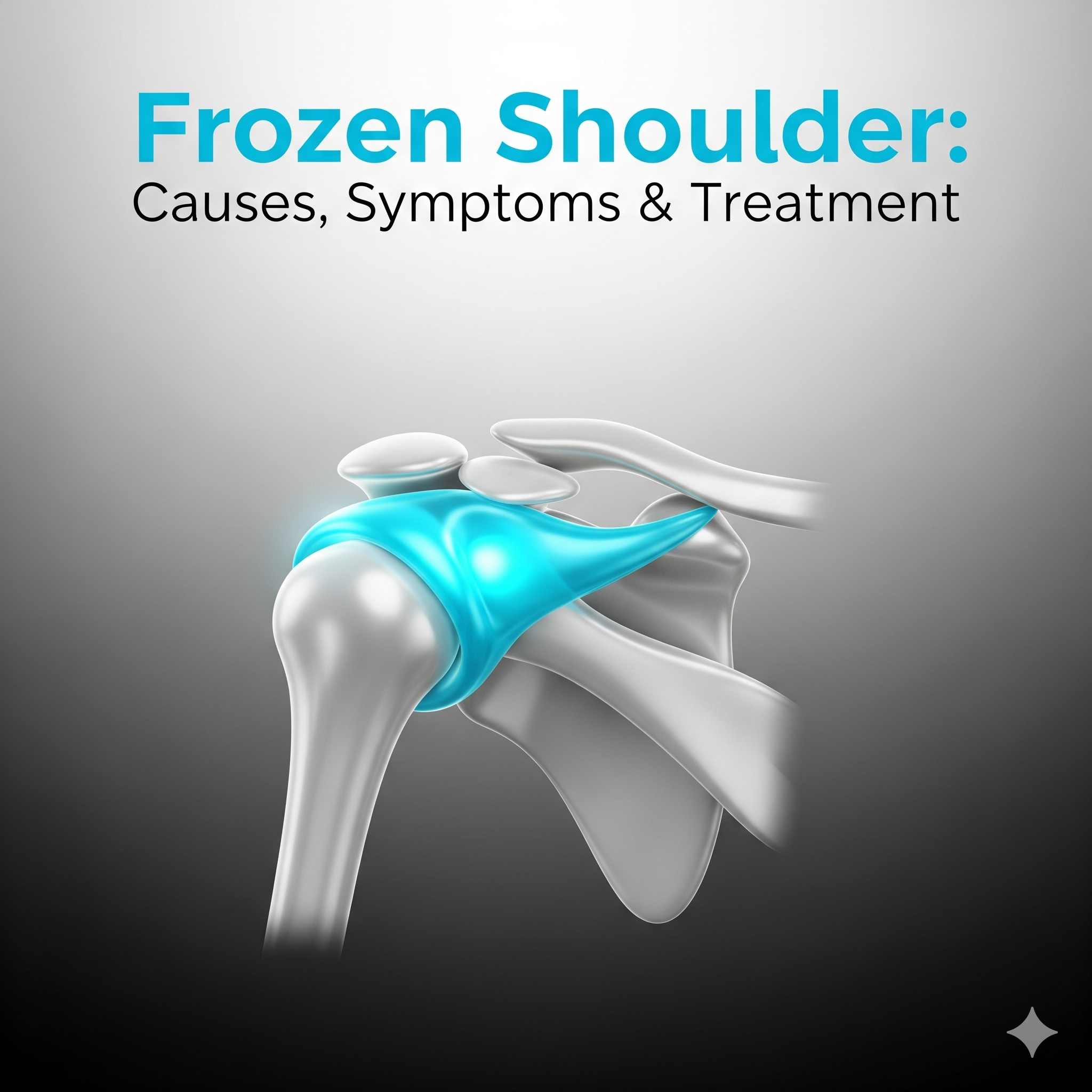Table of Contents
Frozen shoulder treatment in Dubai is one of the most common reasons patients come to see me. Living with shoulder pain that doesn’t go away can be frustrating. For many of my patients, the pain starts subtly — difficulty reaching overhead, trouble fastening clothes behind the back, or waking up at night because the shoulder feels stiff and aching. Over time, the shoulder almost seems to “lock up.” Frozen shoulder treatment Dubai is essential for effective recovery.
This condition is called frozen shoulder, or medically, adhesive capsulitis. While the name may sound intimidating, with the right treatment and guidance, most patients recover fully and return to their normal lives.
In this article, I’ll explain what frozen shoulder is, why it happens, what symptoms to watch out for, the latest treatment options, and how recovery typically looks. Most importantly, I’ll share practical advice from my experience as an orthopedic surgeon in Dubai to help you understand your shoulder and feel reassured about your journey toward healing.
What Is Frozen Shoulder | Frozen Shoulder Treatment Dubai?
Frozen shoulder is a condition where the shoulder joint becomes painful, stiff, and difficult to move. It occurs when the capsule — the thick connective tissue surrounding the shoulder joint — becomes inflamed, thickened, and tight. This reduces the space in the joint and makes movement painful and restricted.
The term “frozen” comes from the fact that the shoulder gradually loses motion. Because of pain, patients stop using the shoulder normally, and the joint capsule continues to stiffen. Without proper treatment, it can feel as if the shoulder is literally frozen in place. Frozen shoulder treatment Dubai is one of the most common reasons patients visit my clinic, highlighting its significance in orthopedic care. Read more here
Why Does Frozen Shoulder Happen?
Unlike some injuries where the cause is clear, frozen shoulder is more complex. We still don’t know exactly why it develops in some people and not in others. However, several factors increase the risk:
- Prolonged shoulder immobility – for example, after a fracture, surgery, or long use of a sling.
- Age – most common between 40 and 60 years old.
- Gender – women are more often affected than men.
- Diabetes – up to 20% of people with diabetes experience frozen shoulder.
- Other health conditions – thyroid disorders, Parkinson’s disease, and cardiovascular disease can raise the risk.
- Injury or surgery – even a rotator cuff tear, collarbone fracture, or shoulder surgery may trigger the condition.
In Dubai, I often see patients who develop frozen shoulder after keeping their shoulder still for too long following an injury or operation. This is why early, guided movement is so important in prevention. Frozen shoulder treatment Dubai is one of the most common reasons patients visit my clinic, Schedule Your Appointment
Symptoms: How Do You Recognize Frozen Shoulder?
Frozen shoulder usually develops slowly and progresses in three stages. Patients often describe it as a cycle of worsening pain and stiffness before gradual improvement:
1. The Freezing Stage (6 weeks – 9 months) | Frozen Shoulder Treatment Dubai
- Shoulder pain gradually increases.
- Pain is often worse at night, disturbing sleep.
- Range of motion begins to decrease.
- Daily activities like combing hair, dressing, or reaching overhead become difficult.
2. The Frozen Stage (2 – 6 months)
- Pain may lessen somewhat.
- Shoulder remains stiff and very limited in movement.
- Tasks like reaching behind your back or lifting objects become nearly impossible.
- Daily function is significantly affected.
3. The Thawing Stage (6 months – 2 years)
- Pain slowly decreases.
- Shoulder movement gradually improves.
- With proper therapy, most patients regain near-normal strength and motion.
- Read more here

Diagnosis: How Is Frozen Shoulder Confirmed?
Diagnosis is usually clinical — meaning it comes from your history and physical examination. As an orthopedic surgeon, I:
- Ask about your symptoms and when they began.
- Test your active range of motion (how far you can move the shoulder yourself).
- Test your passive range of motion (how far the shoulder moves when I move it for you).
- Compare both shoulders to identify stiffness patterns.
Most patients with frozen shoulder have restriction in both active and passive motion, which helps distinguish it from other shoulder problems.
Imaging such as X-rays may be ordered to rule out arthritis or fractures. MRI or ultrasound is occasionally used to exclude other conditions, such as rotator cuff tears. Schedule Your Appointment
Treatment: How Do We Treat Frozen Shoulder?
Many patients search for frozen shoulder treatment Dubai because shoulder stiffness affects daily life, The good news is that frozen shoulder is usually self-limiting — it tends to get better with time. However, without proper treatment, recovery can take up to 3 years. My goal as your doctor is to shorten this period, relieve pain, and restore your shoulder function as quickly as possible.
Conservative Non-Surgical Frozen Shoulder Treatment Dubai
🔹 Medications
- NSAIDs (like ibuprofen) or acetaminophen for pain and inflammation.
- Corticosteroid injections directly into the shoulder joint to reduce inflammation and provide faster relief.
🔹 Physical Therapy | Frozen Shoulder Treatment Dubai
This is the cornerstone of treatment. A physical therapist will guide you through:
- Stretching exercises to maintain flexibility.
- Range-of-motion drills like pendulum swings or wall walking.
- Strengthening exercises once stiffness starts to improve.
In Dubai, I emphasize home exercise programs because consistent daily movement, even if small, is crucial to recovery.
🔹 Heat & Cold Therapy
- Heat helps relax the joint capsule and muscles before exercises.
- Cold packs help reduce pain after activity.
🔹 Electrical Stimulation (TENS)
Sometimes used to reduce pain by calming nerve signals. Schedule Your Appointment
You can learn more here from American Academy of Orthopaedic Surgeons (AAOS)
Surgical Options (If Conservative Care Fails)
If after 6–12 months of therapy and injections the shoulder remains severely stiff, surgical treatments may be considered:
1. Manipulation Under Anesthesia (MUA)
While you are asleep, the shoulder is gently but firmly moved to break adhesions and stretch the capsule.
2. Arthroscopic Capsular Release
A minimally invasive surgery where tiny instruments are used to cut tight portions of the capsule.
Often, these two techniques are combined for best results. Surgery is rarely required, but when it is, patients usually regain significant motion quickly. Read more here
Frozen Shoulder Treatment Dubai: Options & Recovery : What to Expect
Early frozen shoulder treatment in Dubai can speed recovery and reduce pain, Recovery is gradual. Even with the best treatment, frozen shoulder takes time. Most patients notice:
- Pain reduction within weeks of treatment.
- Improved motion after consistent physiotherapy (3–6 months).
- Full or near-full recovery within 1–2 years.
The key is patience and consistency. Many patients in Dubai have busy work and family schedules, but I always stress: even a few minutes of daily stretching makes a huge difference in recovery.
Prevention: Can Frozen Shoulder Be Avoided?
While not all cases can be prevented, you can reduce your risk by:
- Early mobilization after injury or surgery – start guided movements as soon as your doctor allows.
- Regular stretching – especially if you have diabetes or thyroid conditions.
- Good posture and shoulder care – avoiding prolonged immobility.
- Prompt treatment of shoulder pain – don’t ignore symptoms for months. Schedule Your Appointment
FAQs About Frozen Shoulder
1. How long does frozen shoulder last?
It usually lasts between 1 and 3 years. With treatment, recovery is faster.
2. Can frozen shoulder come back after healing?
It rarely returns in the same shoulder but can affect the other shoulder within a few years.
3. Is frozen shoulder related to arthritis?
No. Arthritis affects the joint surfaces, while frozen shoulder involves the joint capsule.
4. Can I exercise with frozen shoulder?
Yes, gentle stretching and guided exercises are encouraged. Avoid forceful movements that cause severe pain. check here
5. Do I always need surgery?
No. Most patients recover without surgery. It is considered only when conservative measures fail. Read more here
Dr. Usama Saleh’s Advice to Patients in Dubai
Frozen shoulder can be a challenging journey, but with the right care, you will recover. Many of my patients worry when they hear it may take months or even years to fully heal, but I reassure them: every small step of progress matters. With proper physiotherapy, medical guidance, and patience, your shoulder will “unfreeze.”
If you are struggling with shoulder stiffness or suspect you have frozen shoulder, I encourage you to book a consultation. Early diagnosis and treatment can save months of pain and help you return to the active lifestyle you deserve. Schedule Your Appointment
About Dr. Usama Saleh
Dr. Usama Saleh is a highly experienced Orthopedic Surgeon in Dubai, specializing in knee, shoulder, and sports injuries. With extensive expertise in ACL reconstruction, arthroscopic surgery, and joint preservation techniques, Dr. Usama is dedicated to helping patients return to pain-free, active lifestyles.
His approach combines cutting-edge medical techniques with a deeply empathetic, patient-first philosophy. Whether you are an athlete recovering from a sports injury or someone struggling with chronic knee pain, Dr. Usama ensures that every patient receives a personalized treatment plan tailored to their needs and goals. Read more here
Take the First Step Toward Recovery
If you suspect an ACL tear or are experiencing persistent knee pain, don’t wait until the injury worsens. Early diagnosis and the right treatment can make all the difference in your recovery.
👉 Book a consultation with Dr. Usama Saleh today and take the first step toward healing, mobility, and getting back to the activities you love.


